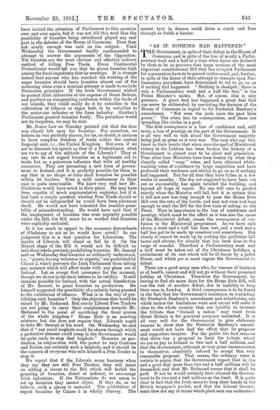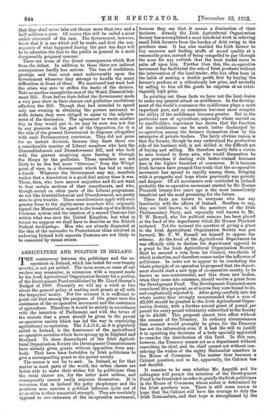" AS IF NOTHING HAD HAPPENED."
THE Government, in spite of their defeat in the House of Commons, and in spite of the loss of nearly a Parlia- mentary week and a half at a time when hours are declared. by them to be so precious that large sections of the most important constitutional Bill that has occupied. Parliament for a generation have to be passed undiscussed , and, further, in spite of the fiasco of their attempt to trample upon Par- liamentary precedent, have determined to try to go on as if nothing had happened. " Nothing is changed ; there is only a Parliamentary week and a half the less," is the Prime Minister's motto. But, of course, this is only pretence. A. great deal has happened, a great deal that can never be obliterated, by rescinding the decision of the House of Commons in regard to Sir Frederick Banbury's amendment. "Not even the gods upon the past have power." The crisis has its consequences, and these are spreading like circles in a pool.
The first consequence is a loss of confidence and, still more, a loss of prestige on the part of the Government. It is all very well to talk about the Government majority being just as great as it ever was. The men who say this know in their hearts that when once the spell of Ministerial victory in the Lobbies has been broken the history of a Government is almost sure to be short and precarious. Time after time Ministers have been beaten by what they cheerily called. " snap " votes, and have obtained white- washing votes of confidence by large majorities and have professed their readiness and ability to go on as if nothing had happened. But for all that they have fallen in a few weeks or months. The dry rot supposed. to have been cut out so successfully has again invaded the building, and beyond all hope of repair. No one will care to predict exactly when the Ministry will fall, but it is certain that it will not now last long enough to pass the Home Rule Bill over the veto of the Lords, and may not even last long enough to send the Bill for the first time of asking to the Peers. Next in importance to the loss of confidence and prestige, which must be the effect as it was also the cause of the Ministerial defeat, comes the consequence of con- fusion in the Ministerial programme. As we have said above, a week and a half has been lost, and a week and a half has got to be made up somehow and somewhere. But clearly it cannot be made up by making the guillotine fall faster and oftener, for already that has been done to the verge of scandal. Therefore a Parliamentary week and a half must be taken out of the Christmas holidays, a curtailment of its rest which will be ill borne by a jaded House, and which per se must expose the Government to defeat.
There are a good many men who, for reasons of business or of health, cannot and will not go without their promised holiday at Christmas. Therefore the Government, • by having to find six more days for the Home Rule Bill, will run the risk of another defeat, due to inability to keep their men in London. A third consequence is to be found. in the fact that the Government's insistence on rescinding Sir Frederick Banbury's amendment and substituting one which makes the limitations weak and unreal will make it clear to the whole country that our liability to increase the tribute that " Ireland a nation " may exact from Great Britain is for practical purposes unlimited. It is all very well for the Government to give elaborate reasons to show that Sir Frederick Banbury's amend- ment would not have had the effect that its proposer and supporters imagine. For the public the fact remains that there was a proposal to limit the tribute which we are to pay to Ireland to two and a half millions, and that the Government, although at very great inconvenience to themselves, absolutely refused to accept this very reasonable proposal. That means, the ordinary voter is certain to argue, that the Government expect that in the end a good deal more than two and a half millions will be demanded, and that Mr. Redmond means that it shall be paid. If not he would certainly have allowed the Govern- ment to fix two and a half millions as the limit. It is quite clear in fact that the Irish mean to keep their hands in the British taxpayer's pocket, and that the Liberal Govern- ment dare not say in terms which plain men can understand that they shall never take out thence more than two and a half millions a year. Of course this will be called a most unfair statement of the case. The Government, however, know that it is one which will be made, and that the con- sequence of what happened during the past ten days will be to advertise the fact to the public in general in a most disagreeably poignant manner. These are some of the direct consequences which flow from the defeat. In addition to these there are indirect consequences hardly less serious. The loss of confidence, prestige, and time must react unfavourably upon the Government whenever they attempt to handle the many difficulties in front of them. We mentioned last week how the crisis was sure to stiffen the backs of the doctors. Take as another example the case of the Welsh Disestablish- ment Bill. Even before their defeat the Government made a very poor show in their closure and guillotine resolutions affecting the Bill. Though they had intended to spend only one evening in obtaining the powers necessary to stifle debate, they were obliged to agree to the adjourn- ment of the discussion. The agreement to waste another day, as they would put it, we may be sure was not due to any pressure on the part of the Opposition, for it is the rule of the present Government to dispense altogether with such Parliamentary courtesies. They did not press for an instant decision, because they knew there are a considerable number of Liberal members who hate the Disestablishment and Disendowment Bill, and who look with the gravest misgiving upon forcing it through the House by the guillotine. These members are not likely to be less but more "tiresome," from the Whips' point of view, to a Government which has had so nasty a knock. Whatever the Government may say, members realize that a dissolution is a good deal nearer than it was. Those, then, who have narrow majorities and do not want to face certain sections of their constituents, and who, though sound on other parts of the Liberal programme, do not like Disestablishment and Disendowment, are pretty sure to give trouble. These considerations apply with even greater force to the eighty-seven members who originally signed the Memorial in regard to the break-up of theBritish Customs system and the creation of a second Customs line within what was once the United Kingdom, but what in future we suppose we shall have to describe as the British Federal Archipelago. Men who are already disgusted at the idea of the surrender to Protectionist ideas involved in endowing Ireland with separate Customs are not likely to be reassured by recent events.















































 Previous page
Previous page